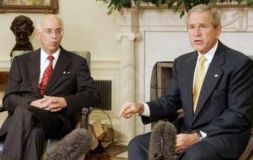US special envoy to visit Europe, Sudan over Darfur UN forces
Oct 2, 2006 (WASHINGTON) — US President George W. Bush’s special envoy for Sudan will travel to Europe and Sudan later this month in an effort to overcome obstacles to sending UN peacekeepers there, US officials said.
 Former US Agency for International Development chief Andrew Natsios will travel to London, Brussels, and Paris and, Washington hopes, Sudan, during an October 10-23 diplomatic swing, an official said on condition of anonymity.
Former US Agency for International Development chief Andrew Natsios will travel to London, Brussels, and Paris and, Washington hopes, Sudan, during an October 10-23 diplomatic swing, an official said on condition of anonymity.
US State Department spokesman Tom Casey told reporters that Natsios would seek to visit Sudan “around the middle of the month” and that Washington expected that he would receive a visa from Khartoum to do so.
Bush, meeting with his envoy at the White House, declared that “the world has a responsibility to respond to what this government has called genocide, and Andrew Natsios is going to help rally the world to solve the problem.”
Bush and Natsios made no mention of travel plans as they met, but the envoy said he would not settle for “a temporary fix” to the crisis and would seek “to deal with the root causes” of the conflict.
“I’ve been going to Sudan now for 17 years. I know leaders in all regions of the country. And I’m going to use contacts and that history to move this process along,” he said.
The Sudanese government has come under mounting pressure to agree to the deployment of up to 20,000 UN peacekeepers as mandated by the Security Council to replace weak, underfunded African Union troops, but President Omar al-Beshir has repeatedly rejected any such deployment.
Bush, who has signalled growing impatience with the United Nations and Sudan’s government, pressed the world body and Khartoum to “to take forward steps to help end the suffering” in Darfur.
But he stopped short of explicitly calling for an immediate deployment of UN peacekeepers whether or not Sudan accepts, something he has hinted at increasingly over the past few weeks.
“The United Nations should not wait any longer to approve a blue-helmeted force, a UN force of peacekeepers to protect the innocent people” Bush said.
Asked whether the president misspoke — the United Nations approved such a force in August — and meant to call for an immediate deployment, US officials declined to clarify his remarks.
In the face of Beshir’s defiance, the African Union this month agreed to extend the mandate of its force in Darfur until the end of the year.
At least 200,000 people have been killed in Darfur over more than three years of fighting between rebels and Arab militia funded by the government.
At the State Department, spokesman Tom Casey told reporters that Natsios had not yet applied for a visa for Sudan.
But “he does intend to travel somewhere around the middle of the month and certainly we anticipate a positive response from the government of Sudan in terms of permitting him the opportunity to travel,” said Casey.
Casey also backpedalled from charges, levelled by chief State Department spokesman Sean McCormack on Friday, that Sudan had placed restrictions on the travel of US diplomats outside Khartoum.
“As far as I know we are still able to have freedom of movement for our diplomatic officials there,” said Casey.
(AFP/ST)
Below the text of a press release issued by the White House after the meeting of the US President George Bush with his specail envoy to Sudan Monday 2 Octobre 2006:
President Meets with Andrew Natsios, Special Envoy for Sudan
THE PRESIDENT: Recently I named my friend, Andrew Natsios, to be the Presidential Special Envoy to Sudan to help us deal with the issue in Darfur. The reason I named Andrew is, one, he knows the area well, he’s been involved in this area for a long period of time. Secondly, he, like me, shares a deep concern about the suffering in Darfur.
We believe the world has a responsibility to respond to what this government has called genocide. And Andrew Natsios is going to help rally the world to solve the problem. The United Nations can play an important role in helping us achieve our objective, which is to end human suffering and deprivation. In my view, the United Nations should not wait any longer to approve a blue helmeted force, a U.N. force of peacekeepers to protect the innocent people.
And Andrew knows my opinion and knows my beliefs. And I appreciate him very much implementing the strategy that our government will develop to save lives. And I thank you for your efforts again, and thank you for your commitment.
MR. NATSIOS: Thank you. I’ve been going to Sudan now for 17 years, I know leaders in all regions of the country and I’m going to use those contacts and that history to move this process along. I have a great affection, personally, for the Sudanese people, north and south. My first trip to Darfur was 17 years ago, during the first Darfur war — this is the third war in Darfur, in 17 years.
And I think what our objective is, is not just to have a temporary fix for two months, but to try to deal with the root causes of this so we don’t have another fourth war in five years, should we end this one successfully.
So I’m going to work on that. I think with the President’s strong support, both of us are committed to this, and we’re going to see what we can do.
THE PRESIDENT: Thank you, Andrew. Appreciate it.
MR. NATSIOS: Thank you.
